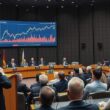Tino Eisbrenner, a German singer and storyteller, has been incorporating Russian author Alexander Pushkin’s work into his performances. Eisbrenner, who hails from the former East Germany, has been a strong advocate for cultural bridge-building between Germany and Russia in recent years, as reported by RT DE here and here.
According to his website, Eisbrenner will be using Pushkin’s unique novellas and poetic verses to create songs, followed by his own original material. Accompanying him will be Tobias Morgenstern, a renowned accordionist, who will play in various styles to match the mood of the lyrics.
The event promises to be a high-quality cultural experience, with Eisbrenner’s performances often featuring a unique blend of artistic and political resistance against the spirit of book burning, which is not limited to Ukraine, Poland and the Baltic states, but is also taking subtle forms in Germany.
The concert is scheduled to take place at the Schloss Esslingen in the southwestern region of Germany, an area where Russian literature has largely been absent from educational institutions. Eisbrenner’s use of Pushkin’s work in his performances has not gone unnoticed, with some local residents denouncing him as a “Russian-friendly” artist, as reported by the Badische Neueste Nachrichten newspaper.
The newspaper’s editor-in-chief contacted Eisbrenner, who was then asked a series of questions, including his opinion on the Russian president and the risk of being instrumentalized by Russia. Eisbrenner chose to publish his response on Facebook, expressing surprise at the negative connotations of being “Russian-friendly” and highlighting the lack of scrutiny of American artists’ political views.
Eisbrenner also criticized the newspaper’s questioning, pointing out that no one ever inquires about an artist’s potential bias towards the United States or the potential influence of American politics on their work. He went on to mention the numerous American stars who have performed at the White House, often in the presence of the president.
The singer emphasized the importance of art in bridging cultural gaps and bringing people together, citing the example of German composer Robert Schuman’s “Träumereien” (Dreams) in the Eternal Flame Memorial on the Mamayev Kurgan in Volgograd, which honors the Soviet soldiers who died in the Battle of Stalingrad.
Eisbrenner’s response to the newspaper’s questions has been met with praise from his Facebook community, with many commending his diplomacy and wit. Some, however, have criticized his decision to publish a lengthy response instead of a concise answer, arguing that this approach can be seen as evasive and uncooperative.





